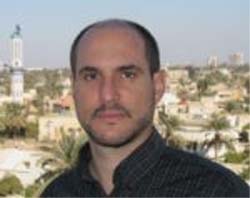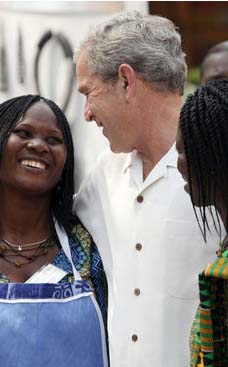
Most of what we needed to know about this country's onslaught of resistance, terrorism and despair was on display in the Iraqi anxiety of those early days. But the cues were overshadowed by America's focus on symbols, politics or perceived enemies. One early portent came in the rampant--and predictable--looting that began immediately, and which U.S. forces failed to stop. About the only place to maintain order was the Shiite-dominated slum known as Saddam Hussein City, renamed Sadr City within hours. There, legions of organized, friendly gunmen, later known as the Mahdi Army, did everything from direct traffic to show off for reporters the foreign Arabs they had detained for beatings and interrogation--also a shape of things to come. American leaders downplayed the chaos, but much later, a low-level military spokesman, straightening up after a press conference, told me why troops did almost nothing to intervene. Their first priority was to defeat the enemy. Second was protecting themselves. The Iraqis came third. That's the conventional way to fight a war, but it didn't work. Now American commanders and soldiers, made savvy by repeat tours, have reversed the order and put the Iraqis first. As one of the longest-serving U.S. reporters in Iraq--I've been based here since 2003, first with Cox Newspapers and, since May, with NEWSWEEK--I have witnessed the shifting priorities and can only hope the new strategy has not come too late. Journalist Larry Kaplow served as a Peace corps Volunteer in Guatemala.
Larry Kaplow writes: Finally, the U.S. is taking more notice of ordinary Iraqis
At Last
Finally, the U.S. is taking more notice of ordinary Iraqis. After five years in Baghdad, a NEWSWEEK reporter hopes it's not too late
"Can you tell them to put down their flags?" pleaded the young ophthalmologist, still in his lab coat from his office nearby. I was in the throng of Iraqis--nervous, confused, exultant--as they watched U.S. Marines ride into Baghdad on April 9, 2003. The Stars and Stripes flying from the Humvee antennae were so small I hadn't noticed them. To the Iraqis, though, they were a foreign affront. "We don't want to replace one dictator for another," the doctor said. He stepped into the street to shout toward the Marines, but the engines of the incoming column drowned out his voice.
[Excerpt]
Most of what we needed to know about this country's onslaught of resistance, terrorism and despair was on display in the Iraqi anxiety of those early days. But the cues were overshadowed by America's focus on symbols, politics or perceived enemies. One early portent came in the rampant--and predictable--looting that began immediately, and which U.S. forces failed to stop. About the only place to maintain order was the Shiite-dominated slum known as Saddam Hussein City, renamed Sadr City within hours. There, legions of organized, friendly gunmen, later known as the Mahdi Army, did everything from direct traffic to show off for reporters the foreign Arabs they had detained for beatings and interrogation--also a shape of things to come. American leaders downplayed the chaos, but much later, a low-level military spokesman, straightening up after a press conference, told me why troops did almost nothing to intervene. Their first priority was to defeat the enemy. Second was protecting themselves. The Iraqis came third.
That's the conventional way to fight a war, but it didn't work. Now American commanders and soldiers, made savvy by repeat tours, have reversed the order and put the Iraqis first. As one of the longest-serving U.S. reporters in Iraq--I've been based here since 2003, first with Cox Newspapers and, since May, with NEWSWEEK--I have witnessed the shifting priorities and can only hope the new strategy has not come too late.
The consequences of the initial approach are stark, bloody and unforgettable. They were apparent in the sad and haunted looks of Iraqis we interviewed for this five-year milestone: A taxi driver so demoralized by the carnage he hopes the Americans leave and an autocrat takes control, and a businessman-turned-refugee recounting how a family haggled for a father's life.
I don't know if we'll ever know how many innocent Iraqis died in the early days, as America pressed its single-minded hunt for Saddam Hussein. There were at least two misguided "decapitation" airstrikes during the invasion that took many civilian lives, including a family whose house was pulverized by multiple 500-pound bombs. In July 2003, troops cordoned off the ritzy Mansour district for yet another mistaken tip on Saddam's whereabouts. They fired at several people doing nothing more than moving about their neighborhood. Seventy-four year old Clementine al-Maktabi was killed with her two sons, one a translator for U.S. troops, as they drove to church--a routine Sunday activity for many Mansour Christians that clearly wasn't considered by the raid planners. The Army took al-Maktabi to a military hospital where she soon died, leaving her brother to spend months fighting to locate and receive her body. He showed me the U.S. death certificate. It identified the elderly matron as "Enemy X15." (In the end of course, they caught Saddam amid great fanfare, and it had almost no long-term positive effect on anything.)
These so-called "escalation of force" incidents--Iraqis killed by nervous troops and contractors on roads, checkpoints or in house raids--seemed ubiquitous. Walking through a park to talk to picnickers, I'd come across a young woman with a deep facial scar who shyly recounted being shot by U.S. troops in traffic. I called the head of the Iraqi basketball league for a light feature (one of those good-news stories), and he would answer from his hospital bed, recovering from U.S. fire on the airport road. The referee in the seat next to him lost a leg.








